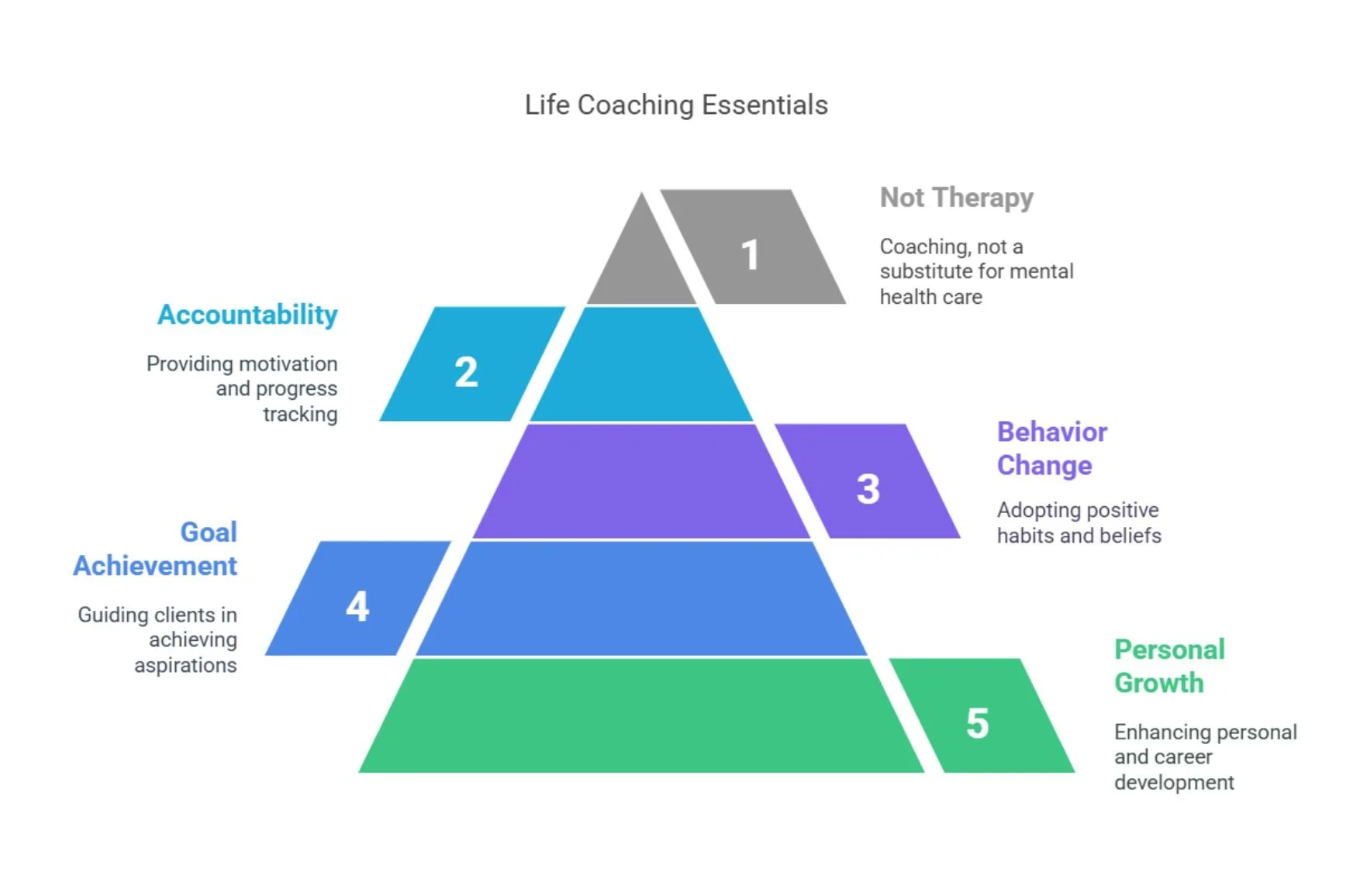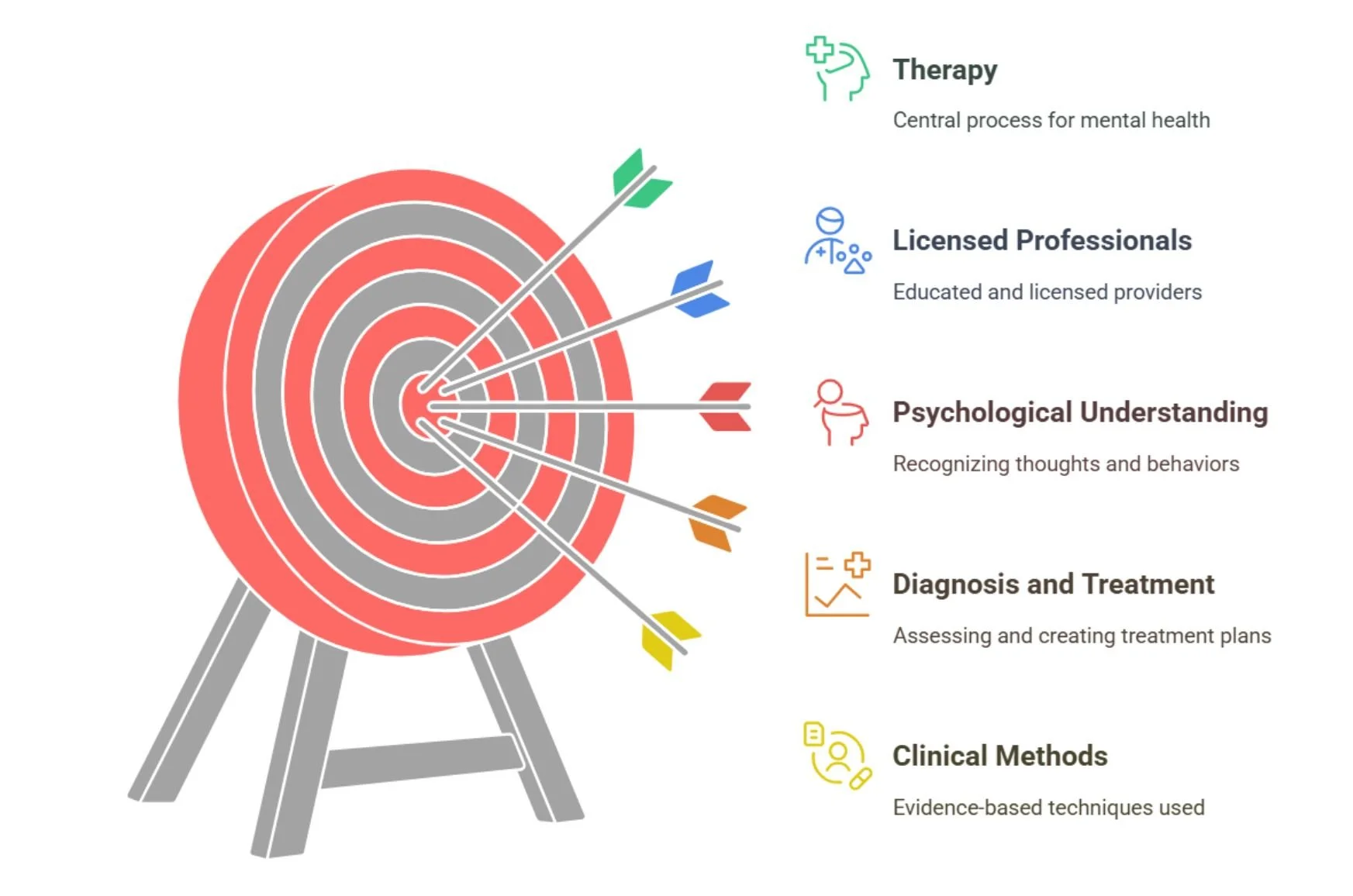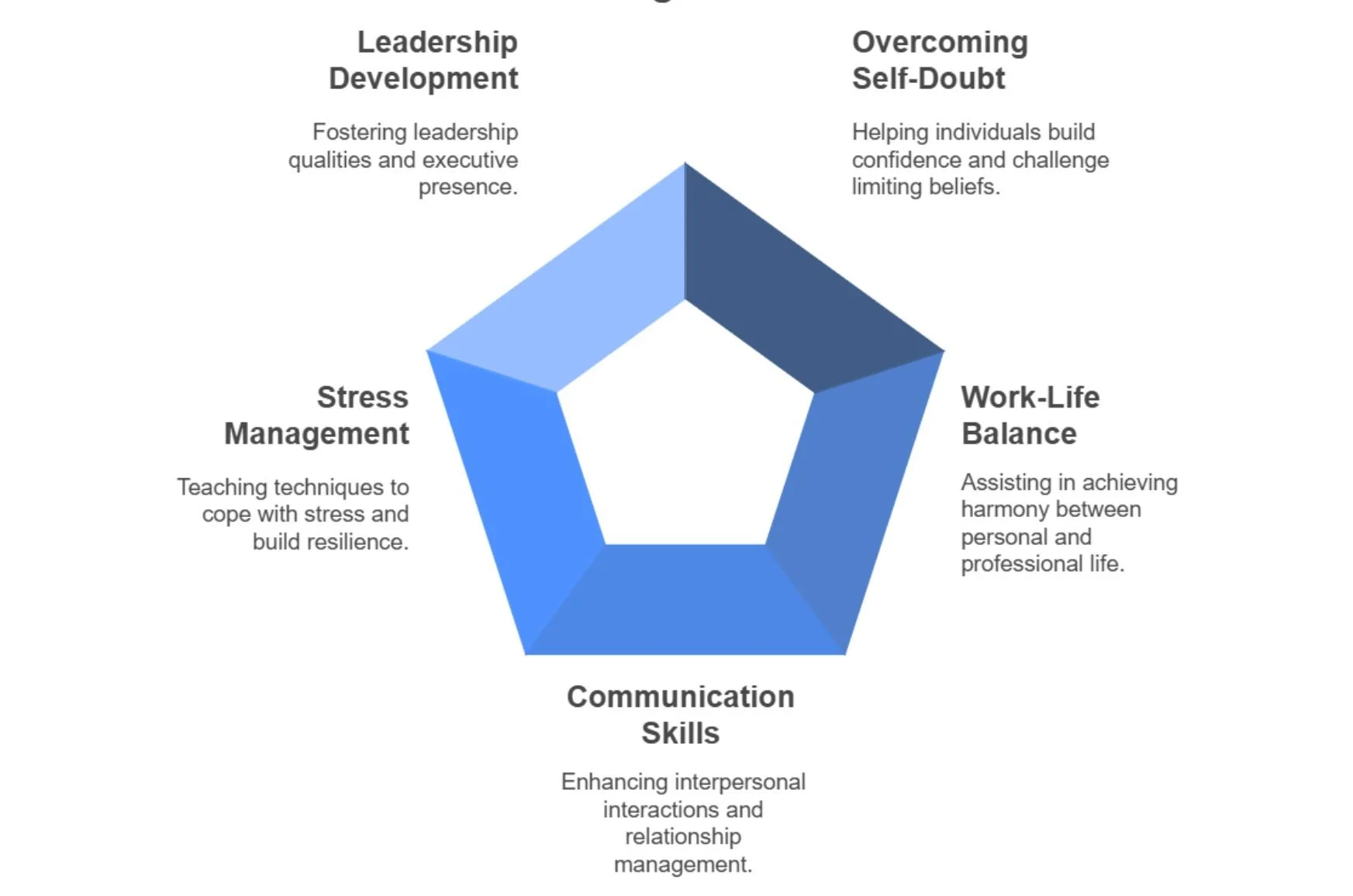The Ultimate Definition of Life Coach: Roles, Benefits, and More
Feeling stuck or uncertain about your life's direction? A life coach can be your strategic partner in personal development. Life coaches help individuals gain clarity, set meaningful goals, and navigate career transitions through targeted wellness coaching. By addressing mental health, personal growth, and professional challenges, they empower clients to unlock their full potential and create fulfilling lives.
What Is a Life Coach?
A life coach is a personal development expert who helps clients clarify goals, overcome obstacles, and design actionable plans for transformative change. They provide accountability, empowerment, and targeted support, bridging the gap between a client’s current reality and their aspirations.
Life coaches undergo specialized training, often through the International Coaching Federation (ICF), a recognized body that sets standards for certification and professional development.
Life coaches assist clients with:
Career transitions and professional development
Goal setting and personal achievement
Relationship coaching and interpersonal skills
Work-life balance strategies
Stress management and mental well-being
Confidence and self-esteem building
Leadership and executive coaching
Time management and productivity
Overcoming limiting beliefs
Life Coaching vs. Therapy
While both life coaching and therapy aim to improve well-being, they serve distinct roles:
Life Coaching
Focuses on personal and professional growth: Life coaching helps individuals enhance their personal and career development by setting clear objectives and taking strategic actions.
Helps clients set and achieve goals: Life coaches guide clients in identifying their aspirations and creating step-by-step plans to turn them into reality.
Encourages behavior changes and mindset shifts: Through structured coaching sessions, individuals learn to adopt positive habits and reframe limiting beliefs to achieve success.
Provides accountability and structured support: A life coach offers ongoing motivation, tracks progress, and helps clients stay committed to their goals with consistent support.
Not a substitute for mental health treatment: While coaching enhances personal development, it does not replace therapy or clinical mental health care for serious psychological conditions.
Therapy
Provided by licensed mental health professionals: Therapists undergo specialized education and licensing to diagnose and treat various mental health conditions.
Focuses on understanding psychological patterns: Therapy helps individuals recognize deep-seated thoughts, emotions, and behaviors that influence their mental well-being.
Diagnoses and treats mental health conditions: Mental health professionals assess, diagnose, and create treatment plans for conditions like anxiety, depression, and PTSD.
Uses clinical methods such as CBT or EMDR: Therapists utilize evidence-based techniques like Cognitive Behavioral Therapy (CBT) or Eye Movement Desensitization and Reprocessing (EMDR) to support healing.
Works with medical teams when necessary: In some cases, therapists collaborate with psychiatrists or medical professionals to ensure holistic care, including medication management if required.
Benefits of Life Coaching
Here are the top life coaching benefits:
Improved Confidence: Around 80% of individuals who work with a life coach experience a boost in self-confidence, helping them take on challenges with greater assurance.
A Growth Mindset: Life coaching encourages individuals to shift their perspectives, embrace challenges as opportunities, and continuously work on self-improvement.
Enhanced Self-Awareness: Coaches provide objective feedback and reflective exercises that help clients better understand their strengths, weaknesses, and thought patterns.
Better Communication and Relationships: Over 70% of coaching clients report improved relationships due to enhanced communication skills, emotional intelligence, and conflict resolution strategies.
Greater Clarity and Purpose: Coaching helps individuals define their personal and professional goals, providing them with a clearer sense of direction and renewed motivation.
Improved Well-Being: Studies show that 77% of clients experience significant improvements in their overall well-being within a few months of consistent coaching sessions.
Lower Stress Levels and Higher Resilience: Coaching provides tools and techniques to manage stress effectively, build resilience, and maintain a positive mindset even in difficult situations.
Limitations of Life Coaching
Life coaching is not a replacement for professional mental health care. While it helps individuals develop positive habits, build resilience, and enhance overall well-being, it does not provide clinical diagnosis or treatment for mental health disorders.
Those experiencing conditions such as anxiety, depression, PTSD, or other psychological concerns should seek support from a licensed therapist or mental health professional. Therapists are trained to diagnose and treat mental health conditions using evidence-based methods such as cognitive-behavioral therapy (CBT) or medication when necessary.
Although life coaching can complement therapy by fostering strong mental fitness practices, goal-setting, and mindset shifts, it is not a substitute for medical or psychological intervention. If someone is struggling with severe emotional distress, trauma, or psychiatric disorders, professional therapy is the appropriate course of action.
What Problems Do Life Coaches Solve?
Life coaches help individuals:
Overcome self-doubt and limiting beliefs
Improve work-life balance and career satisfaction
Enhance communication and relationship skills
Manage stress and build resilience
Develop leadership abilities and executive presence
Types of Life Coaching
Personal Coaching: Focuses on self-improvement, relationships, and general well-being
Career Coaching: Helps with job transitions, professional growth, and goal setting
Relationship Coaching: Supports clients in strengthening personal and professional relationships
Wellness Coaching: Focuses on physical, emotional, and mental health
How Much Does a Life Coach Cost?
Life coaching rates vary based on experience, credentials, and session length. On average, coaches charge between $75 and $500 per hour. Executive and specialized coaches may charge even more. The value of coaching should be weighed against the personal and professional growth it provides.
Are Life Coaches Worth It?
Life coaching provides structure, accountability, and guidance. Many individuals find it beneficial for overcoming challenges, boosting confidence, and achieving personal and professional goals.
How to Choose the Right Life Coach
When selecting a life coach, consider:
Rapport: Choose a coach you feel comfortable with
Expertise: Ensure they specialize in your specific goals
Availability: Regular sessions are key for progress
Impact: A good coach helps track progress and fosters growth
How to Find a Life Coach
Self-Reflection: Identify what you want to achieve
Coach Selection: Look for certified coaches with relevant training and expertise
Verify Credentials: Check certifications from organizations like the ICF
Assess Fit: Schedule an introductory session to evaluate compatibility
10 lesser-known facts about life coaching:
Origin in Sports Psychology – Life coaching evolved from sports psychology principles, where coaches helped athletes develop mental resilience and peak performance strategies.
Not Just for Struggles – Many successful individuals, including CEOs and celebrities, use life coaching to enhance their already thriving careers and personal lives.
Coaching vs. Consulting – Unlike consultants who provide direct solutions, life coaches empower clients to discover their own answers through guided reflection and accountability.
Brain Science Backing – Coaching is supported by neuroscience, as it encourages neuroplasticity—helping the brain form new, positive thought patterns.
Action-Oriented Approach – Unlike therapy, which often explores past experiences, life coaching is primarily focused on the present and future, with actionable steps to create change.
Confidential but Not Regulated – Life coaching is not legally regulated like therapy, so certification programs like ANHCO provide credibility and industry standards.
Not Just for Individuals – Life coaching is used in corporate settings to improve team performance, leadership skills, and workplace satisfaction.
Boosts Physical Health – Studies show that coaching can improve overall well-being, including better sleep, reduced stress, and healthier lifestyle choices.
Diverse Specializations – Coaches specialize in niche areas such as confidence coaching, relationship coaching, career transitions, and even spiritual coaching.
Highly Personalized – No two coaching experiences are the same; sessions are uniquely tailored to fit each client’s values, goals, and personal growth journey.
Start Your Coaching Journey
Choosing the right life coach can be a transformative step toward achieving personal and professional growth. A skilled coach helps you gain clarity, break through limiting beliefs, and create a structured plan to reach your goals. Whether you seek greater confidence, improved relationships, or career advancement, coaching provides the guidance and accountability needed to thrive.
If you're passionate about helping others unlock their potential, consider becoming a certified life coach. A trusted certification program ensures you develop the skills, knowledge, and ethical foundation required to support clients effectively.
ANHCO’s Life Coach Certification is designed to equip aspiring coaches with the expertise needed to make a meaningful impact. With a comprehensive curriculum, practical coaching techniques, and industry-recognized credentials, ANHCO empowers you to start a rewarding career in life coaching. Take the next step toward personal and professional fulfillment—begin your coaching journey with ANHCO today!
FAQS
-
A life coach is a professional who helps individuals identify and achieve personal or professional goals by providing guidance, support, and accountability in various aspects of life.
-
A life coach works with clients to clarify their goals, create actionable plans, overcome obstacles, improve decision-making, and enhance personal growth through structured coaching sessions.
-
Unlike therapists or counselors, life coaches focus on future goals and personal development rather than resolving past emotional issues or mental health conditions. They are more goal-oriented and action-driven.
-
Working with a life coach can provide clarity on goals, boost confidence, increase motivation, improve decision-making, enhance work-life balance, and help with personal transformation.
-
Anyone seeking personal or professional growth can benefit from life coaching, including individuals facing life transitions, career changes, relationship challenges, or those looking to improve their overall well-being.
-
While certification is not legally required, obtaining a recognized certification, such as from the International Coach Federation (ICF), can enhance a life coach’s credibility and professionalism.
-
While formal education is not mandatory, life coaches typically have training in coaching techniques, communication skills, psychology, or personal development. Certification from an accredited program is also a common qualification.
-
Becoming a life coach typically takes several months to a year, depending on the certification program chosen. Training can range from 60 to over 200 hours, followed by practical coaching experience.





